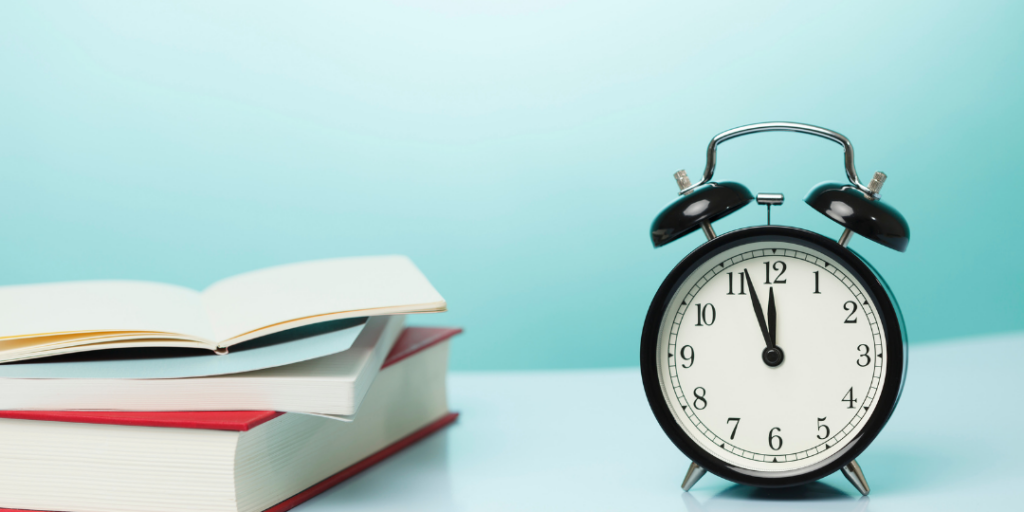When your student reaches a point in their education when coursework requires more vigorous studying, all sorts of questions arise:
When is the best time to study and memorize information?
Should students study during the day or at night?
While some learners (or parents) feel passionately one way or the other, the answer isn’t clear cut.
Varying circadian rhythms and lifestyles mean what works for one won’t necessarily work for all.
To help you determine what’s best for students, let’s look at the best time to study for the brain in light of your children’s personality.
Morning Person or Night Owl?
Thousands of people each month search for the best time to study …
- Math
- Physics
- Chemistry
- Biology
- History
But I don’t know if the answer lies in a search engine.
I tend to think it’s a matter of consistency—whatever time an individual can commit to (and remain diligent in) is the best time for them.
Many believe that morning is best for retaining new information, but daytime studying isn’t always practical.
If your student is a night owl—and waking up is a slow, groggy process—then studying in the morning may not be ideal.
On the other hand, if they can’t focus at night or drift off easily, then they should probably study during the day.
In other words, the most effective study schedule is the one you can stick to consistently.
Maximize Study Time with This Daily Schedule
Experience the power of time blocks for study sessions. This printable tool makes it easy!
That said, let’s look at a few pros and cons for each time of day.
The Case for Morning or Afternoon Study
Daytime studying certainly has its advantages.
Benefits of Studying During the Day
The most obvious reason to study during the day is that, in theory, you just woke up from a good night’s sleep.
Your brain is refreshed, alert, and ready to absorb new information. As such, it’s typically a great time to read and memorize.
Here are a few more points in favor of daytime studying:
- In the afternoon, your brain better integrates new information with older knowledge.
- Natural daylight stimulates “wake-up” hormones that also boost your mood. If you’re able to study near a window, you’ll reap those benefits even more.
- Studying during the day means you don’t have to cut into your sleep time to finish working.
While each benefit above is valuable, I believe the greatest advantage is protection from events that threaten to disrupt your schedule.
When you complete your study session first thing in the morning, it isn’t hanging over your head the rest of the day. That means less anxiety, greater confidence, and more time to accomplish other tasks.
Potential Problems with Daytime Studying
The primary issue I see with daytime studying is that its success hinges on the night before.
If you stayed up too late the night before or slept poorly, your brain will be slow to wake no matter how much of an “early bird” you are.
The other potential problem is the ever-present battle with the snooze button, but that’s just a matter of developing the habit of discipline.
How to Make Studying During the Day Work for You (or Your Student)
If you want to commit to a daytime study schedule, here are a few tips to make it work:
- Account for evening responsibilities when determining the best time to wake up and study. If you can’t get to bed until 10:00 p.m., don’t plan to get up at 4:00 a.m. In other words, build in sufficient sleep time.
- Capitalize on natural light. In warm weather, try studying outside. During the winter months, sit near a window.
- Make a plan to block out distracting noises. Try wearing headphones while you study to limit distractions.
- Eat a high protein breakfast before you start, so you’re not fighting blood sugar highs and lows.
- Drink water as soon as you get up. A hydrated body is more alert. Think of it as a kickstart for your brain.
The Case for Evening Study
If daytime studying doesn’t suit your student, no worries. Nighttime studying has benefits as well.
Benefits of Studying at Night
The most obvious benefit of studying at night is working with your circadian rhythm.
Assuming you’re studying at night because you want to—not because you have to—your brain is probably more awake to take in knowledge.
Evening study has a few other perks as well:
- Sleeping immediately after you study allows your brain to rest and retain what it just learned.
- You’re exposed to fewer distractions. In most households, there’s much less noise and other activities demanding your attention.
- If you’re a night owl, you’re probably more creative at night and better able to imagine all aspects of what you’re learning.
Potential Problems with Nighttime Studying
Even if studying at night appeals to your natural rhythm, some potential problems may arise:
- After a long day, it’s easy to put off studying. You might have to fight procrastination—a common, but ineffective study habit.
- You may underestimate the time required and have to stay up too late to finish. If you study during the day, you can adjust your plans to still fit it in. That’s a lot harder to do at night.
- You can’t predict exhaustion. Even if you’re a night owl, it can be hard to focus and retain information when you are tired.
How to Make Studying at Night Work for You
If you or your student needs to study at night—either out of choice or necessity—try these tips to make it easier:
- Make sure you get enough rest. If you have to get up early for other responsibilities, start studying as early in the evening as possible to maximize sleep time.
- Avoid late-night caffeine. They may help you temporarily, but they will ultimately disrupt your sleep cycle.
- Review your study material either the night before or during the day to ensure you’ve planned enough time to study while still enjoying a good night’s sleep.
What Does the Science Say Is Best for Your Brain?
While scientists don’t agree 100% (on anything!), some studies indicate that the brain acquires new information more efficiently at certain times.
According to one such report, the scientifically proven best time to study can occur during one of two daily windows:
The first window is mid-morning to early afternoon. Surprisingly, the second time block is in the evening between 4:00 p.m. and 10:00 p.m.
If you’re not sure which of the two prime studying windows works best for you or your student, don’t assume—test them out.
Being a night owl doesn’t necessarily mean the evening slot is perfect for your schedule.
Test your actual alertness during that time by trying both windows—not just the one you assume will work.
While you may feel more alert at night, you may also be more distractible then.
The most important thing to dictate your study schedule is consistency.
If you know there’s no way you can consistently get up at 5:00 a.m. to study, be practical and plan accordingly.
If the time that works best for your brain is also the time that you’ll be pulled in too many directions, take that into consideration.
Establishing a healthy, consistent routine is more important than picking the “perfect” time of day.
So, Is There an “Official” Best Time to Study?
Want to know the absolute best time for studying?
It’s whatever time works best for you.
To determine your ideal time frame, test the times of day when you are most alert.
Then, take into account your real personality. Don’t try to convince yourself to wake at the crack of dawn if you have a long history with the snooze button.
Likewise, don’t stay up after everyone else has gone to bed if you’re known for nodding off at 8:00 p.m.
Finally—and perhaps most importantly—review your daily responsibilities and potential distractions to ensure your study routine is one you can follow consistently.
The “official” best time to study is the time frame that you can commit to on a regular basis.
Does your student need help studying effectively? Help them develop the skills to transform their study sessions from stressful to successful:


